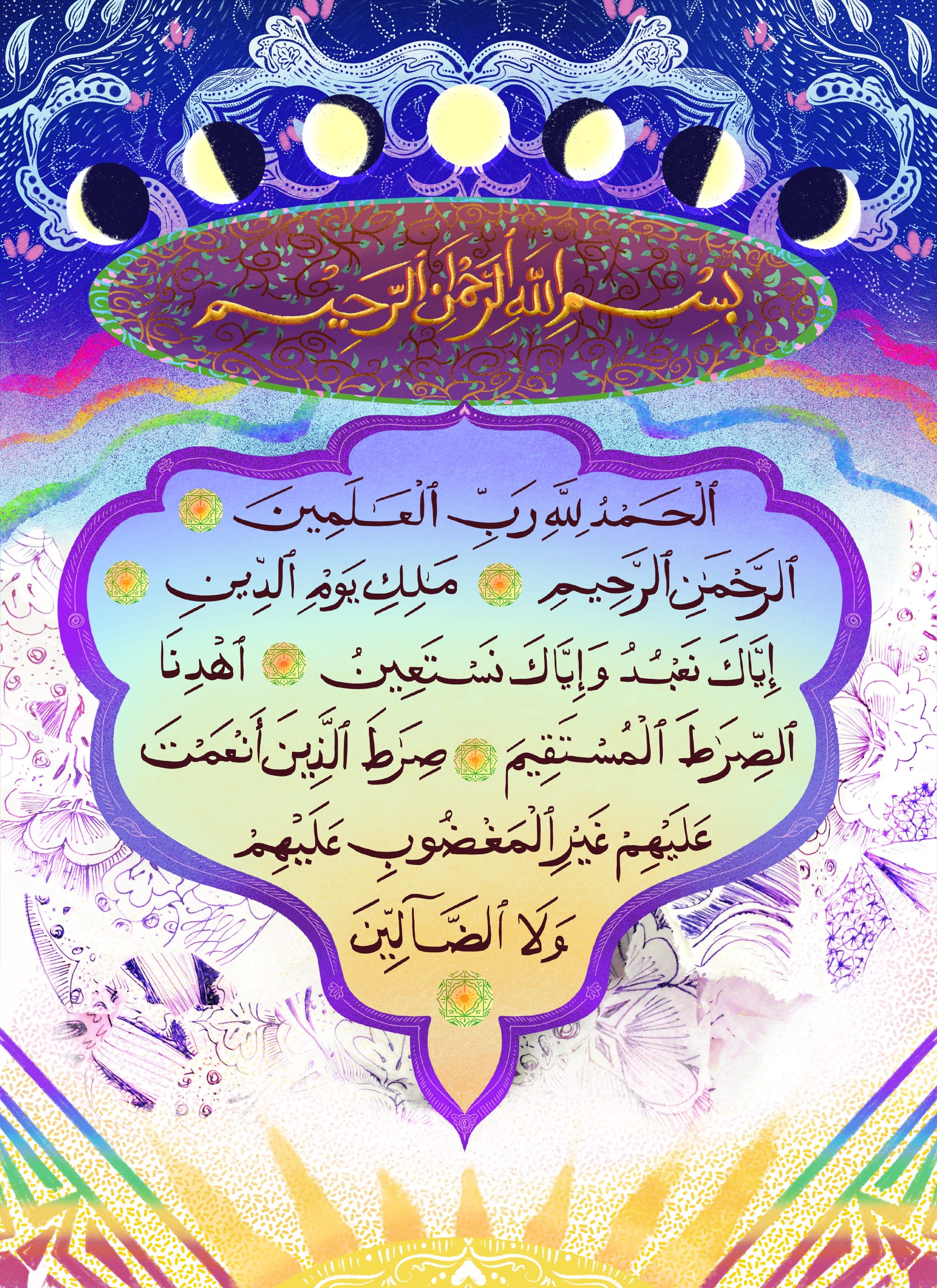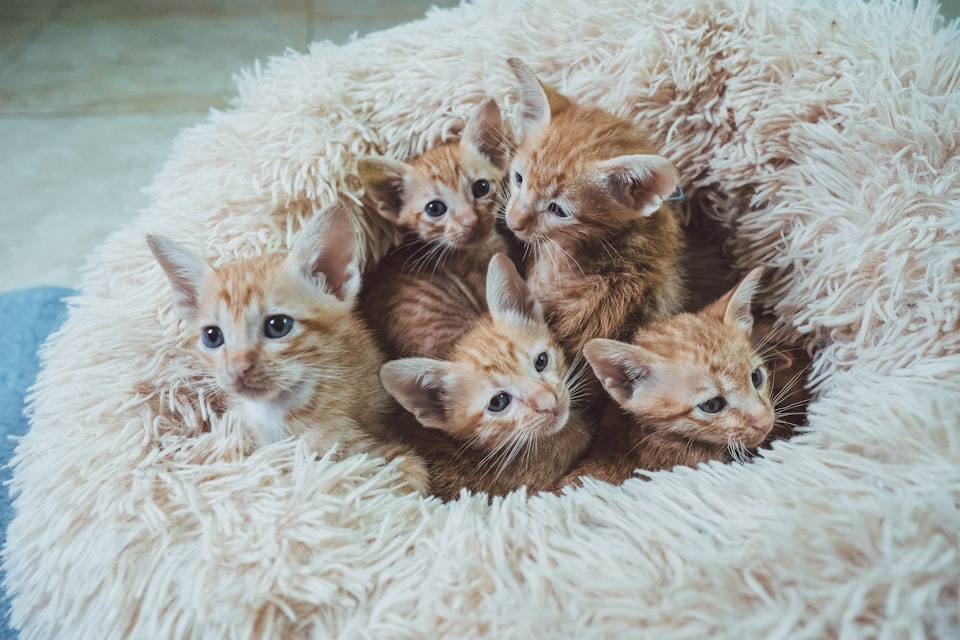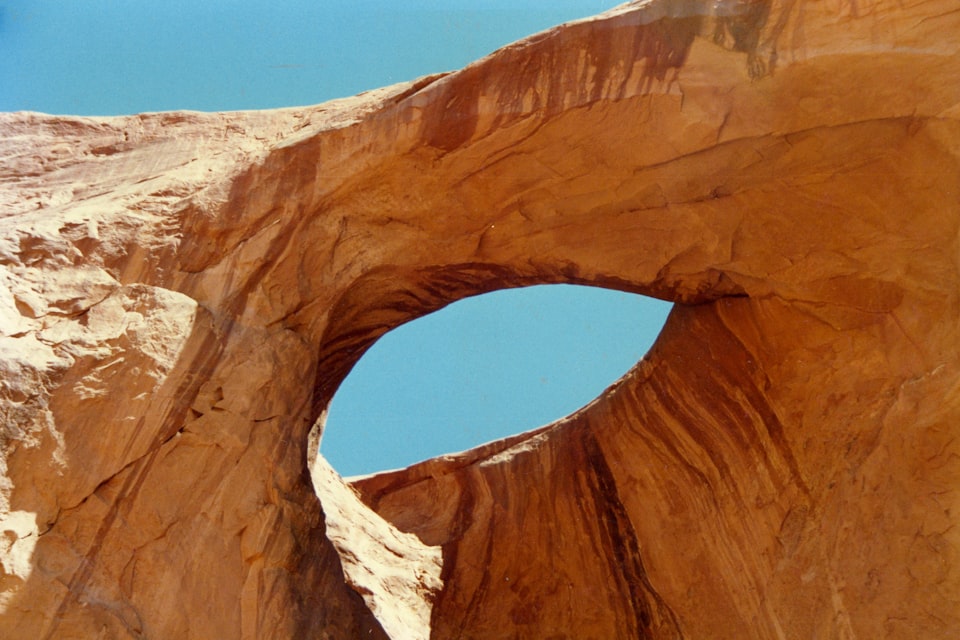Building belief and narratives of our faith (The Signs In Ourselves, Part 5 of 12)
Many of us have experienced a disconnect between our faith and queer aspects of our identity. Was this the case for you? Muslims reflect on how their understanding of God changed with their understanding of themselves.
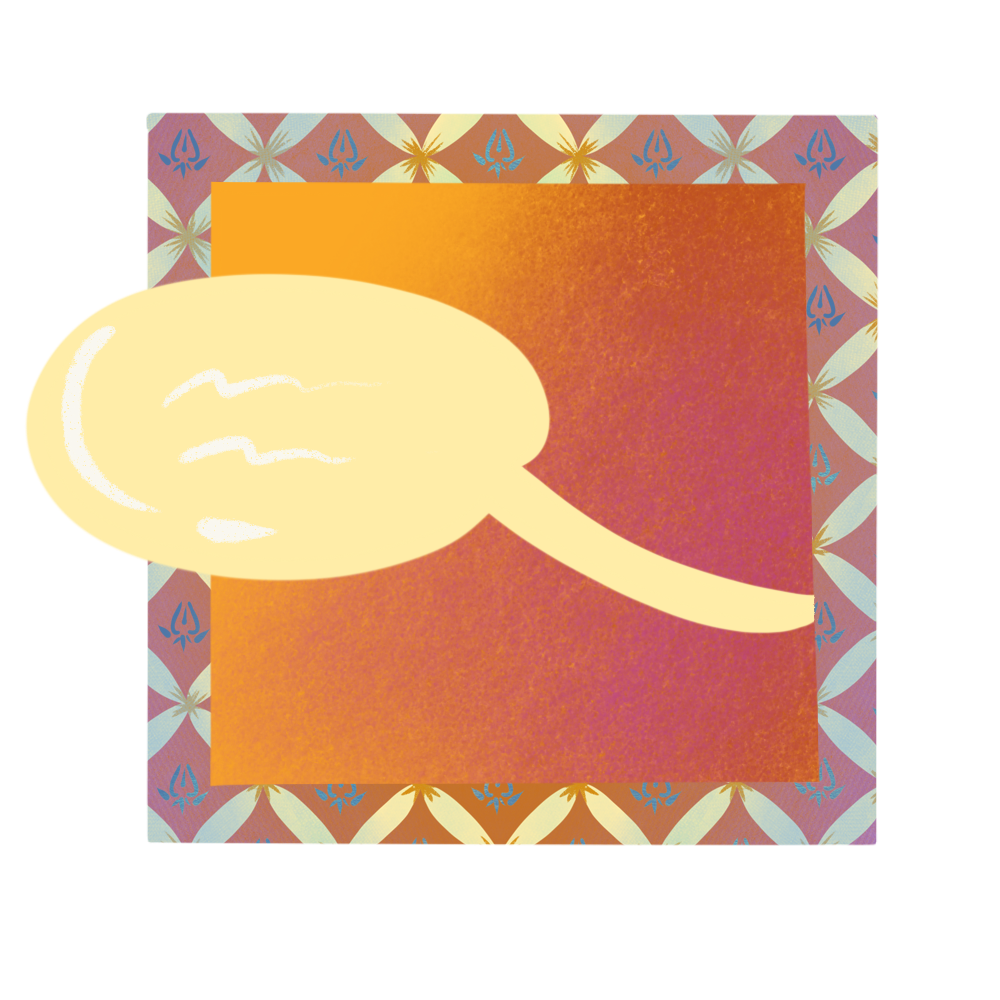
In this part, you will be invited to reflect on how your understanding of God grew with your understanding of yourself. If you need more time, read on for other people's stories and answers. Remember to come back when you're ready.
- Earliest memories of receiving God
- Negotiating faith and sexuality
- Arriving to current spiritual location
- Exercise 4

EARLIEST MEMORIES OF RECEIVING GOD
Do you remember when you were first told about God?
They did not remember being introduced to God— “Although I must've been. What I mean by that is I don't remember there ever being an absence of God in my early life. My most positive earliest memory of God was through devotional songs and dhikr, those recordings were played in the house way back when I was a baby, like qawwalis of dhikr and nasyeeds of the Qasidah Burdah— still a big favorite for me.”
For a while, it was a very friendly, musical relationship. However that quickly shifted. “At the age of 3-5, I was introduced to my most negative experience of God when my parents began to physically abuse me. They used religion and ‘for the sake of Allah’ as excuses to continue the physical abuse until I was 18. Through the abuse, my relationship to God would shift from love to desperation or outright rejection, peppered with a series of near death experiences, until I finally left my family home in my 20s. It was only after I left and set boundaries between them and me that I could hear and receive God again— as myself and for myself.”

Q1. What was your earliest understanding of God?
What were you first told about God, and who said it?
These stories were generously sent from people in a total of 14 countries who responded to an online call to be anonymously part of this project. They identified as 1) Muslim by choice 2) not as a cisgender heterosexual person. Their stories are meant to accompany you and your collaborators through this workbook.
- "I understood God as a big person when I was very young." (15, gay, he/him)
- "I always thought God was someone who is extremely rich and lives in a big house where everything is white. At first I thought Islam has no place for a trans or a homosexual, and God does not permit it. Then realisations happened and I learn and understand more every day I get older. My belief in God grows stronger as I age. I had a tricky relationship with God. Sometimes I get angry with God, sometimes I think of apologising to God for being ignorant, sometimes I love God for just being there for me." (33, trans woman, she/her)
- "God was a white-haired white man in the clouds. It was available in all the Christian images of God that came my way. The race of God as depicted was never commented upon, so it was reinforced. Mercifully this racialised and gendered notion was so easy to let go of because of how concrete and limited it was. That allowed me to head down the road to a more transcendental idea and image." (convert/revert, nonbinary, they/them)
- "My mom first told me about Allah. I was 5 or 6. It made me so mad, because I would ask all these questions about Allah's characteristics that she said didn't exist. "What color is their eyes?" They don't have eyes. "What kind of clothes do they wear?" They don't wear clothes. "So they're naked?" No, not that either. It was so confusing to even consider!" (cis woman, USA, she/her)


NEGOTIATING FAITH AND SEXUALITY
She was in a three year relationship with a woman who believed being themselves was haram. “I met someone and at first we had a relationship where we were like, let's start praying together— which was great. And then she increasingly became super right-wing conservative! This ex was butch and so were her friends. They were all in queer relationships and not really religious. At the same time, I was beginning to get involved with rights activism, meeting activists, and being completely inspired by all that. This obviously created a problem. She didn't want me to lean that way politically, and tried to pull me back. I started to chip away a lot of parts of myself, and the relationship became abusive in a different sense. She would tell me: Jangan tegakkan benang yang basah, which is to say ‘Don’t try to find justifications for your desires.’ There’s so much out there about what other people say God wants, but what does God really want? And what did I want? I was confused about my values. I paid a lot of attention to what other people were saying. And my ex’s stance on queerness and Islam was that it was a haram combination. She started to wear the hijab in our second year. Since I already wear it, I taught her how to. I liked giving people the benefit of the doubt. But since the personal is political, what happened was these disagreements just took over— like about supporting trans people and being a feminist. She'd shut me down and use the excuse of: I'm doing this for your own good because I care, because I love you. We argued about how do you care for someone and do so without imposing your beliefs on them. When people like her believe that there is only one right path, they tend to be very controlling because they fear for you. It's a very toxic way of showing someone you care.”
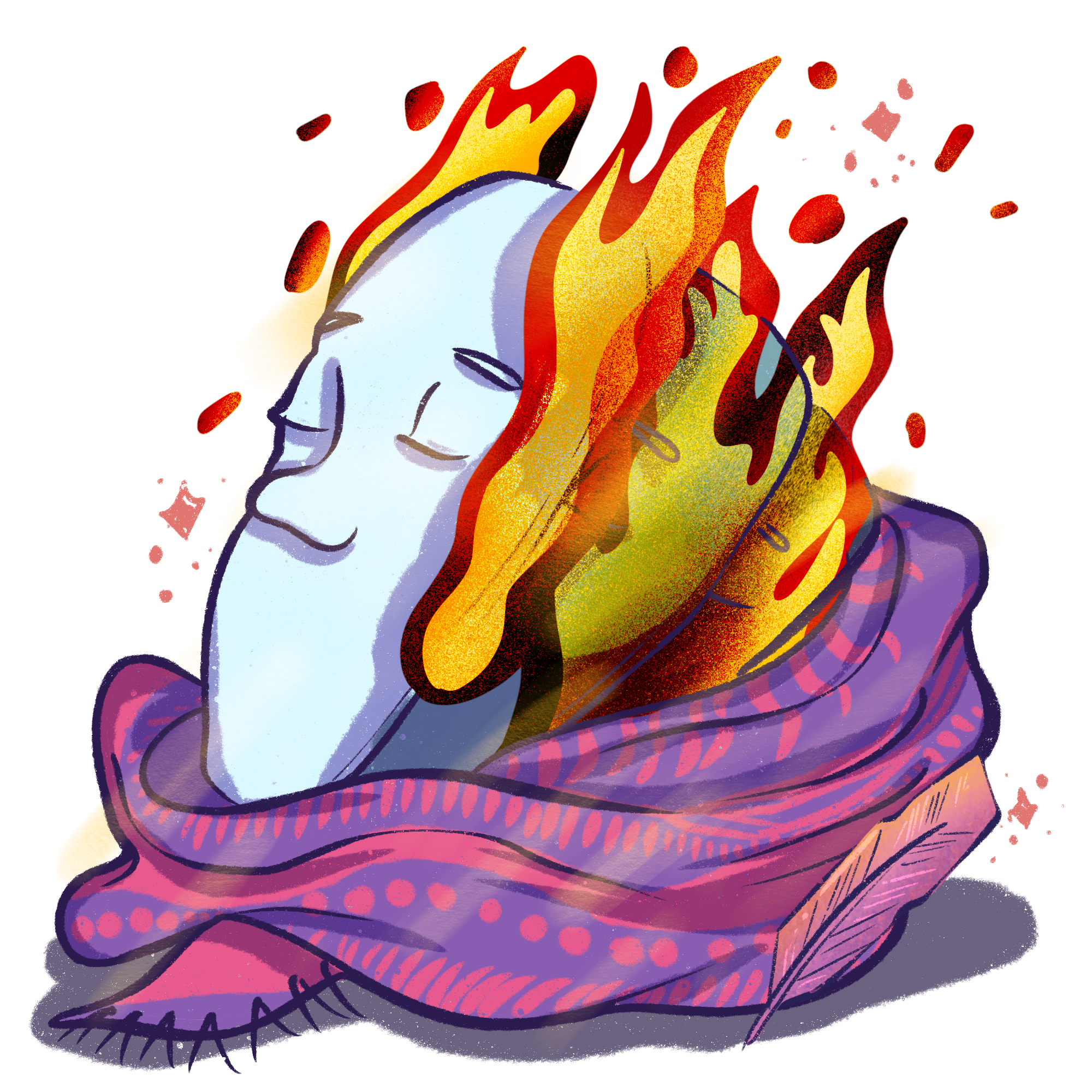
Q2. Many of us experienced a disconnect between our faith and sexual identity. Was this the case for you?
How did discovering your queerness affect what you learned about God? Did your relationship with God change when you encountered your queerness? If you embraced Islam later in life, how did learning of God change how you viewed yourself?
These stories were generously sent from people in a total of 14 countries who responded to an online call to be anonymously part of this project. They identified as 1) Muslim by choice 2) not as a cisgender heterosexual person. Their stories are meant to accompany you and your collaborators through this workbook.
- "I always thought being queer was haram. My relationship with Allah didn't change but I wondered if my queerness was a test, challenge, or something that was to be accepted. I had a lot of religious anxiety around being queer. But Alhamdulillah, it passed." (mother, pansexual, she/her)
- "I always thought I was a sinner who would burn in the deepest parts of hell because God doesn't like men like me, or people like me. It was natural that I hated myself. I thought God has clearly stated in the Quran what he did to Lut's people and how he abhors men who have same-sex attractions. I would try to think about women in the same way as I thought about men, but it never happened." (35, Pakistan, they/them)
- "I felt anger, because if I expected anything from anyone, it was God. I felt as though He deprived me from having a life as easy as others, from the sinless relationships I could have if I were straight." (cis man, Qatar, he/him)
- "I felt an almost immediate schism. I also felt a little betrayed to be honest, and abandoned. I felt like I had done everything "right" Islamically, only to have this massive thing thrown at me. I didn't understand why I was being tested in such a massive way, when I had spent my entire life up to that point always trying to follow Islam exactly, to the point of rigidity. I ultimately believed it was a test I would overcome, and I prayed very hard for God to change me. I went through a very intense, and almost traumatic, period of turmoil, faith-wise. I was a mess." (30, Egypt, she/her)
- "I started self-harming when I was 13 due to the overwhelming self-hate that I was experiencing due to my sexuality and depression. That self-hate quickly turned into anger towards religion. I know I'm not an atheist, but I didn't want to be tied down by a thousand year old scripture either! I used to try to change and prayed that God would make me like boys, but I have accepted my sexuality now." (19, Malaysia, she/her)
- "I almost immediately stopped calling myself Muslim when I started calling myself queer. I thought I had to— like if I didn't do it, someone else would do it for me. I'm lucky I'm able to live with my truth at such a young age, because I know it's still difficult for so many others. It wasn't until I started seeing the work of Muslim creatives that I found out that LGBTQ Muslims existed. I would search for "LGBTQ Muslim" and see what popped up. But my relationship with God did not change. I've always believed in a higher being, and looking back I don't think I ever stopped being a Muslim. I just felt ashamed of calling myself that because I thought it wasn't possible." (18, pansexual, she/her)


ARRIVING TO CURRENT SPIRITUAL LOCATION
When she entered her 30s, she had the opportunity to work for about a year in the USA. Creating distance from her religious trauma gave her room to explore faith again. “It was there when I attempted to study the Quran again. I felt like I gained a new perspective of it when I didn't have the pressure of being around other Muslims back in Malaysia. Because of that freedom, I think I understood it better. It's not that Americans are so great. It's just that nobody bothered me about what I looked like, what I wore. So I came back to the Quran because I wanted to understand what God said. Not anyone else, or their interpretations. I had enough of people telling me what they think of what God said and expecting me to take that as truth. By then, I studied a lot of other things on my own and understood them, so why not the Quran? A lot of what I read opened my eyes to the fact that many, many Muslims unfortunately behave nothing like what's described in the Quran. It was a very 'F*** you guys!' moment. Where I'm at now, I've embraced the mystery that comes with building a relationship between believer and Being. I don't need anyone else to understand what my relationship with God is. Even my anger with God is nobody else's business. I don't need justification, approval, I don't need to demonstrate my faith to anybody. In fact I find the way a lot of people demonstrate faith in Malaysia is vulgar. Through my readings and valuing the fact that I get older every day, I realise I need to spend every bit of time I have living it the way I want to.”

When he was young, he was told half of his family would go to hell. “My mother used to say: God made man, man made religion, religion made war. My ustazes and ustazahs in primary and secondary school used to say that all non-Muslims would go to Hell, which traumatised me because my mum's side of the family is not Muslim. My mum used to tell me these ustazes and ustazahs were idiots, but that wasn't very comforting because I had internalised the idea that my mum, being a convert, wasn't a ‘proper’ Muslim.”
When he believed he would go to hell too, he tried another path altogether. “First, I tried to pray the gay away. I would seek repentance as a teenager and be terrified when I still had desires for other boys. When I went to university, I was too traumatised from the Friday khutbahs which talked repeatedly about hellfire and worldly punishments for homosexuals. One day I couldn't take it anymore and I thought— if I can't stop being gay, maybe I should stop being Muslim. By then I was making so many non-Muslim friends studying in Australia. They were delightful and good people. They knew I was gay and accepted me. So I thought if they are damned, and I am damned, then something must be horribly wrong with Islam. I decided to just stop believing. But I couldn’t ‘do’ atheism. I couldn’t leave Islam alone.”
So he started looking at other spiritual possibilities. “I explored Buddhism, Christianity, Judaism, and Hinduism. I was thirsting for a spiritual path, but one that would include me and not threaten me with eternal damnation."
Strangely enough, it was a signal from Muslims back home that anchored him. “After awhile, I discovered Sisters in Islam in a documentary on the Australian Broadcasting Corporation TV network, and they saved my life. I also discovered queer Muslim websites and discussion forums like Queer Jihad and Al Fatiha in the US. Finally, I discovered the reformist writings of the British Muslim intellectual, Ziauddin Sardar. These encounters slowly helped me to climb back into Islam from the abyss of depression and self-hatred that I had fallen into.”
He revisited Islam with fresh eyes to arrive where he is today. “I’ve had to completely destroy my earliest preconceptions about Islam— and religion— and rebuild it from the ground up. What went into it? Encountering Sisters in Islam in person when I returned to Malaysia. Discovering the works of progressive and feminist Muslim writers such as Fatima Mernissi, amina wadud, Omid Safi, Scott Kugle, Ziba Mir-Hosseini and so many more. Learning about Islam for myself. Learning about the religious traditions that nourished the friends I respected in Malaysia, especially Roman Catholicism and Lutheran and Orthodox Christianity. Praying my first Friday jummah prayer led by an openly gay imam at an LGBTQI conference. Discovering Imaan, the LGBTQI Muslim organisation based in London, and then the Inclusive Mosque Initiative, also based in London. I always thought my spirituality is deficient and too renegade for anyone to accept, but my devoutly-Muslim friend once told me, you are spiritual! Another Sufi friend said to me that I am supporting the Prophet’s work through my queer jihad. It’s Muslims like these who nourish me and give me faith. Allah makes His/Her/Their signs known to me through these amazing Muslims who affirm me and open their hearts to me.”

Q3. Can you share your current spiritual location?
What did you have to negotiate to arrive there? Describe events, conversations, or people that supported you in changing your mind and affirmed where you are today.
These stories were generously sent from people in a total of 14 countries who responded to an online call to be anonymously part of this project. They identified as 1) Muslim by choice 2) not as a cisgender heterosexual person. Their stories are meant to accompany you and your collaborators through this workbook.
- "What changed my mind was visiting my first ever international convening of queer Muslims in 2016. I accepted myself afterwards and my self-hate stopped. It was just a big surprised to me that there were so many activists and feminists who were so confident in their beliefs and kept practicing Islam. Learning about interpretations beyond orthodox selectivity made me calm down that I wasn't the one in the wrong direction in need to repent just because I'm queer. Islam is about love and peace, and so is my feminism. It is revolutionary and possible to see these two are not against each other, and in fact can complement each other to strengthen our movements. I learned that I wasn't the only feminist who considered herself queer and not abandoned by God because of who she is. God used to be male to me, and now I don't have an image of God, I think God is very deep inside of me. The fact that I can still pray, fast, and believe what I want to believe is Allah's power for me. I do not believe anymore that God is eager to punish." (single mother, 31, she/her)
- "I met a friend when I was studying my masters in the UK and she was the religious type. I assumed she was the judgemental religious type from the clothes she wears, typically modest Malay Muslim clothes with the hand socks. When I got to know her, she was not who I thought she was. Her approach to spirituality is inspired by Rumi and I liked how she approaches worship and piety. Being friends with her made me realise that it's okay to struggle with being a Muslim and making mistakes along the way. She proved to me that there is more than one way to being Muslim." (29, Malaysia, she/her)
- "I think the work of Scott Siraj al-Haqq Kugle changed my life. I remember reading his works one night after a recommendation from a friend. I cried for several hours. I regret being away from God and I regret not looking for answers. I regret hating myself and nurturing that frustration for so long, believing that God doesn't love me. Kugle's writing completely transformed me, but it took some years to set in. I had help with other scholars' works too. My friends and I started our own Quran interpretation class with the help of different tafseers and translations: it helped us a lot. I am at a very peaceful and a just relationship with God at this point in my life. I used to imagine myself in front of God when praying in my early 20s to present my case to when doing the sajda, being completely submissive and presenting all myself to Her love. I have recently started imagining God as gender neutral or preferably a Her, and somehow that has improved my understanding of God." (gay, Pakistan, they/them)

Exercise no.4
from the workbook The Signs In Ourselves
Your Turn: Personal Reflection
Reflect on your personal story of Truth in three parts:
- What was your earliest understanding of God, and how did you learn it? What were you first told about God, and who said it?
- Many of us experienced a disconnect between our faith and sexual identity. Was this the case for you? How did discovering your queerness affect what you learned about God? Did your relationship with God change when you encountered your queerness? If you embraced Islam later in life, how did learning of God change how you viewed yourself?
- Can you share your current spiritual location? What did you have to negotiate to arrive there? Describe events, conversations, or people that supported you in changing your mind and affirmed where you are today.
Collective Discussion
Practice deep listening by exchanging your three-part story of Truth other queer Muslims fairly in pairs or groups.
This post is adapted from The Signs In Ourselves (pp. 40-45), a queer spiritual wellbeing workbook inspired by Qur'an verses 41:53, 51:20-21, and interviews with Southeast Asian Muslims. Written by Liy Yusof and illustrated by Dhiyanah Hassan, it was made available online in 2020 by the Coalition for Sexual & Bodily Rights in Muslim Societies. May Allahﷻ accept this offering and bring it to those who need it. Letters and inquiries: qmcourage [at] gmail [dot] com.
